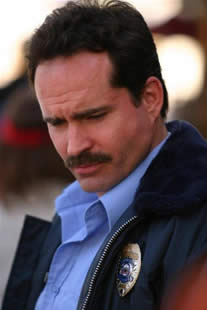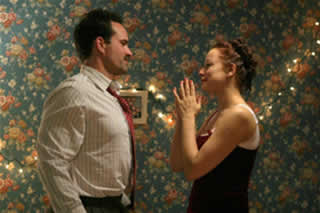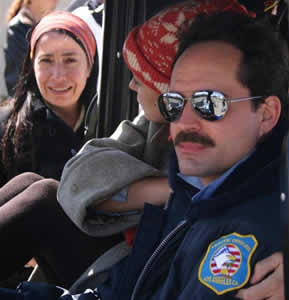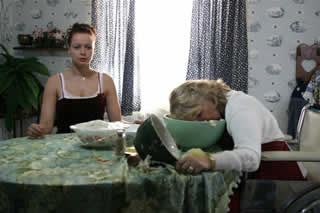The sight of a dark-suited municipal employee doling out parking violations stirs a primal hate in all but the most enlightened souls. And the heroine of EXPIRED, the meter maid Claire, knows it. The film revolves around Claire, a kind soul who resents having to enforce the law at all times, and Jay, an angry Traffic Officer who loves his job, it being the perfect outlet for his anger and frustrations. Coming both from a place of despair and loneliness, Claire and Jay meet and engage in a tumultuous and twisted relationship, which will eventually teach them that love can spread magic seeds of redemption and hope, even in the most unlikely of souls. By the end, Claire is faced with the question of whether to engage or to run…
After participating at Sundance and Cannes, now “Expired” will be screened at AFI FEST 2007.
 CECILIA MINIUCCHI (Writer, Director & Producer) makes her first fiction-feature directing and writing debut with “Expired” following an accomplished body of work in a multitude of mediums. She has made a variety of documentaries and music videos, is an exhibition-quality still photographer, and she writes songs, short stories, poetry and screenplays. In 1990, she wrote and directed a 60-minute feature called “Normality”, featuring Domiziana Giordano, Darrell Anderson, Del Samora and Roberta Bassin.
CECILIA MINIUCCHI (Writer, Director & Producer) makes her first fiction-feature directing and writing debut with “Expired” following an accomplished body of work in a multitude of mediums. She has made a variety of documentaries and music videos, is an exhibition-quality still photographer, and she writes songs, short stories, poetry and screenplays. In 1990, she wrote and directed a 60-minute feature called “Normality”, featuring Domiziana Giordano, Darrell Anderson, Del Samora and Roberta Bassin.
Born and raised in Italy, Miniucchi was educated at Rome’s LUISS (Free University of International Social Sciences), where she focused on political science. The program took her to the Sorbonne, Oxford and finally to Harvard for a graduate degree in literature. She completed an apprenticeship with famed director Lina Wertmuller and also worked with The Taviani Brothers (“Good Morning Babylon”) and Federico Fellini.
After Harvard, she studied at the American Film Institute in Los Angeles. Following the AFI, she interned at Francis Coppola’s Zoetrope Studios in Hollywood, and has made Los Angeles her primary home ever since.
Miniucchi’s documentaries have cast an eye upon cinema titans such as Robert Altman, Francis Coppola, Martin Scorsese, and Paul Verhoven; musicians; composers; writers — even an American financial genius. “Charles Merrill: An American Tycoon” was commissioned by and shown on PBS in 2001.
The entirety of Miniucchi’s oeuvre otherwise is about art and artists. “Peggy’s Skylight” (2001) features Andy Summers of the Police interpreting Charles Mingus on guitar; “Terry Riley’s Musical Rainbow” (2004) looks at American minimalism and contemporary composers including Philip Glass; “I Drink, I Gamble And I Write (1997), about cult novelist Charles Bukowski who wrote “Barfly,” was re-released on DVD in 2002 by Warner Bros as part of a package which also includes Barbet Schroeder’s cinematic adaptation. “Nitsch 98” (2000), a documentary about contemporary performance art, premiered at MOCA and screened at the Rotterdam Film Festival. “Selena Remembered” is about the assassinated Mex-Tex music star whom Miniucchi knew well because she had directed all of her music videos.
interpreting Charles Mingus on guitar; “Terry Riley’s Musical Rainbow” (2004) looks at American minimalism and contemporary composers including Philip Glass; “I Drink, I Gamble And I Write (1997), about cult novelist Charles Bukowski who wrote “Barfly,” was re-released on DVD in 2002 by Warner Bros as part of a package which also includes Barbet Schroeder’s cinematic adaptation. “Nitsch 98” (2000), a documentary about contemporary performance art, premiered at MOCA and screened at the Rotterdam Film Festival. “Selena Remembered” is about the assassinated Mex-Tex music star whom Miniucchi knew well because she had directed all of her music videos.
Miniucchi has made dozens of music videos for stars such as for Gloria Estefan, White Zombie, Ricky Martin, Devo, Andy Preboy and her first, titled “President,” for Jeffrey Coulter ‘s group called American Martyrs received an MTV award.
Bijan Tehrani: EXPIRED is one of the rare movies made in the last decade in US because it deals with real life and real people. The movie goes to extremes in being honest and that is absolutely admirable. What inspired you to make EXPIRED?  Cecilia Miniucchi: Well, as you speak of honesty… the film is quite honest and so was its inspiration: a simple look at life as it unfolds in the streets of Santa Monica, where I live. I was walking by and witnessed a rather disturbing incident between a rough and impolite man and a gentle parking officer, a woman that was more scared than anything else. Then later, I was victim myself of one of those unwanted and unnecessary tickets, given to me by an angry parking officer, a man that was totally abusing his small authority. I thought to myself: I wonder what would happen if two of these parking officers, diametrically opposite in temperament, would meet and fall in love… I thought of this as a metaphor for life: the price any of us can, could and would pay for love and its risks and gifts. And the story took over and I wrote it really fast. Human condition, beyond any tricks and simulations, is what I find fascinating to observe and talk about: in its deepest loneliness, its deepest fears and its unexpected gifts.
Cecilia Miniucchi: Well, as you speak of honesty… the film is quite honest and so was its inspiration: a simple look at life as it unfolds in the streets of Santa Monica, where I live. I was walking by and witnessed a rather disturbing incident between a rough and impolite man and a gentle parking officer, a woman that was more scared than anything else. Then later, I was victim myself of one of those unwanted and unnecessary tickets, given to me by an angry parking officer, a man that was totally abusing his small authority. I thought to myself: I wonder what would happen if two of these parking officers, diametrically opposite in temperament, would meet and fall in love… I thought of this as a metaphor for life: the price any of us can, could and would pay for love and its risks and gifts. And the story took over and I wrote it really fast. Human condition, beyond any tricks and simulations, is what I find fascinating to observe and talk about: in its deepest loneliness, its deepest fears and its unexpected gifts.
Bijan: Did you know anyone in real life like Jay and Clair? How did you develop these two characters?
Cecilia: I think we all know Jay and Claire; not only the Jay and Claire within us, but also the ones outside of us. An abusive relationship whether is physical, emotional or just verbal… I think it is something that we have all experienced, even for a few minutes. These are characters that remind us of other characters; they don’t begin and end with themselves.
Bijan: It’s hard to label EXPIRED as a “comedy noir” or “drama” or “romantic”; it bridges over all these genres. Was this done intentionally to take the audience to a journey like real life?
Cecilia: Well, this is something that I take as a compliment, meaning the fact that the film is hard to classify or pigeonhole into a genre. However, the American distributors, and at times the audience too, feel a bit at loss and would love to be able to reduce the film to something they are already familiar with and label it with a precise genre…
a precise genre…
Bijan: All through EXPIRED, as a filmmaker, you step away from making any judgments about characters or situations and you leave this to us as the audience.
Cecilia: I personally enjoyed this freedom that you gave me even if it put me in a difficult position as it is so hard to decide against or in favor of a character in the movie. For example you can not just turn against Jay, because of what he does to people, actually you feel for him. There is a bit of Jay in all of us. What do you think?
Bunuel used to say that if he did have answers, he would be a politician (this was before the shameful bunch of politicians we have today that can hardly even speak, so fancy giving any answers). I do not have answers at all, I can’t judge or present truths or try to manipulate people to think this or that way. I can only present what I think, see, observe, feel and let them respond in their own way, hopefully making them active spectators and not passive ones, like the whole mass media world likes to keep them. And so I love and hate both of my characters, I think they are both right and wrong, good and bad, as human nature is well beyond our pedestrian analysis and one is the result of so many things, circumstances, facts, tragedies and so on, that no one is ever guilty, really. It is up to us to embrace and understand one another. And yes, I think we all have Jay and Claire too inside of us. Love and Thanatos, as the Greeks used to think, the light and dark, the good and bad: Plato’s dualism that we carry inside everyday.
 Bijan: The visual aesthetic of the movie from cinematography to set design matches the mood of the movie, how did you come up with the visual style of the film and how did you execute it?
Bijan: The visual aesthetic of the movie from cinematography to set design matches the mood of the movie, how did you come up with the visual style of the film and how did you execute it?
Cecilia: The fact that the film was low budget I think it helped as we could not afford anything different from what these actual characters could afford. I like photography a great deal, I do some myself as well, and I was looking at a book of a British photographer I really respect, as he is very honest in his work and showed this book to my heads of department and it all unfolded from there. We immediately were all on the same page. I had a very precise look, color palette in mind and a very specific way to shoot this film by using only a steady-cam. This to give the actors the honest freedom and space of being and doing whatever they felt was appropriate, with no restrictions or limitations of movement or lighting.
Bijan: EXPIRED is an unconventional project and it is a blessing for US cinema that you have managed to make it. How challenging was financing the movie and making it?
Cecilia: This particular film happened rather fast. I wrote the scri pt and a few months later, thanks to my producer Jeffrey Coulter, who also wrote the great score for the film, I was shooting Expired. But, I must say, that it took forever if you consider all the years that I tried to find financing for my scri pts, which are all similarly difficult to label as a specific genre and, therefore, scary for the financiers.
Bijan: I believe that EXPIRED offers a certain honest look at life that you could only see in the great work of Italian New Realist filmmakers, while it has characteristic of its own. Do you think that EXPIRED could start a new wave of filmmaking in the US with a more honest approach to life?
of its own. Do you think that EXPIRED could start a new wave of filmmaking in the US with a more honest approach to life?
Cecilia: It would be nice if my work could contribute for the better to filmmaking in general. I believe that the audience is always ready to receive an honest piece of work, or a new piece of work, something that we have not really seen before, and it is our task as artists to create it and bring it to the audience, making sure that we stimulate the audience and bring it towards us and not the other way around. What’s the point of keeping the audienc at the same level and making it less receptive and intelligent than it can be? I can only think of a calculative, almost evil intention that at the end has its answers in politics and, of course, money.
Bijan: At the end of the movie it seems that the two main characters of EXPIRED, Jay and Claire, have come to an understanding about their relationship and themselves. Do you believe their future will be different? I was wondering about this while leaving the theater.
Cecilia: The ending of the film got simplified from what I originally planned. But it still gives out the same feeling of ambiguity. Yes, these people have grown by taking the risk of being together and if they will be back together it will be a bit on different terms and if they both move on, they will carry within themselves the gift of love: those  tiny changes that we can attempt to do or let life make for us. The film is an invitation to love: love, go out there, hurt, get hurt, but love and no matter how horrible it can be, you will always walk out of it with a gift: the gift of a small, honest growth.
tiny changes that we can attempt to do or let life make for us. The film is an invitation to love: love, go out there, hurt, get hurt, but love and no matter how horrible it can be, you will always walk out of it with a gift: the gift of a small, honest growth.
Bijan: What are the latest movies that you have enjoyed watching?
Cecilia: I have not seen many films lately, as I was making this one and it took all I have in time, energy and so on, but I did see a couple of films I liked. I can’t remember them right now, sorry. I don’t like a lot of them, maybe that’s why. I hardly like my own.
Bijan: Please tell us about your future projects.
Cecilia: I have two scri pts that I have written that I would like to make. One is called “Love Ahead” and the other one is called “Pluck”.

